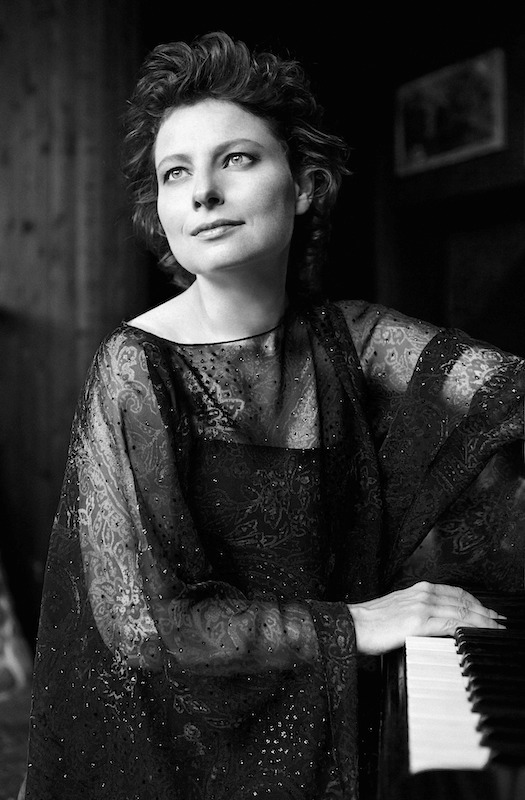Beethoven-inspired piano project brightest in new music

The coronavirus pandemic has undone many plans for Beethoven’s 250th birthday, likely the biggest classical anniversary of our time. Fortunately some of the less conventional Beethoven homages are still happening this fall, such as the recital offered online by pianist Yael Weiss Saturday evening, presented by the National Museum of Asian Art.
For a project she calls 32 Bright Clouds, the Israeli-American pianist has commissioned new music in response to each of Beethoven’s 32 piano sonatas. She has chosen composers from current and former conflict zones around the world and further requested each composer to weave in a snippet from the “Dona nobis pacem” movement near the end of Beethoven’s Missa Solemnis. Beethoven identified this melody as “a call for inward and outward peace.“
The nationwide lockdowns stalled Weiss’s ongoing presentation of the works last March, but this month she has returned to performing them in online concerts. She played four of the new pieces on this program, including one in its world premiere, bookmarked by two complete sonatas of Beethoven. Conversations with the composers and explanations by Weiss gave further context to the new pieces in this 90-minute livestreamed program.
Weiss opened with Beethoven’s Piano Sonata No. 27, a work in two movements, one as moody as the other is serene. The work’s dedicatee, Count Moritz Lichnowsky, “reported that Beethoven told him the sonata was a dialogue between ‘Head and Heart’,” according to biographer Jan Swafford. Weiss’s touch at the keyboard was too clipped and unvaried at times, and her pedaling heavy in the sweet second movement.
In general Weiss distinguished herself more in the new music, beginning with Saed Haddad’s Nuages Funèbres (Funereal Clouds). Directly inspired by the sonata that came before it, Haddad focused more on Beethoven’s dark first movement. The opening, beginning in the piano’s muddy lower registers and often dwelling there, had the feel of a bleak funeral march. It continued mostly in this vein, even when quoting the peace motif and ending on a major triad still clouded by dissonance.
Haddad, who hails from Jordan, wrote in the online commentary after the performance that “Peace agreements are empty, because of their incapacity to change human beings to the better.” He further explained that he translated this emptiness musically by taking out the middle pitch of Beethoven’s peace motif, leaving a minor third, and relating it to the Arabic mode Hijaz Kar, with its focus on augmented seconds, the enharmonic equivalent of that interval.
The next composer featured on the program, Sidney Marquez Boquiren from the Philippines, dedicated his piece, Unheard Voices, to victims of extrajudicial killings in his country. In a symbolic gesture, he has the performer play the piece while listening to a recording of the work that inspired it, the slow movement of Beethoven’s Piano Sonata No. 7, via headphones. The composer acknowledged that the idea for the technique came from a piece by Celeste Oram.
Not only does the audience not hear Beethoven’s “voice,” sounding only in the performer’s ears, but the performer cannot hear much of what she herself is playing. We heard a series of extended arpeggiations, trills, and tremolos, wisps of sound reminiscent of Debussy at times. The piece ended with enormous flat-hand clusters in the bass register, “like gunshots,” as Weiss described them, which apparently coincided with quiet moments in the Beethoven piece.
The world premiere, Willow, was by Milad Yousufi, a composer from Afghanistan. In a brief conversation he said he began to express himself artistically first through calligraphy, poetry, and painting and only later came to music when it was no longer banned in his country. Yousufi, who described himself as a synesthete, also created a painting and calligraphic poem that went with the composition.
Yousufi’s music seemed quite tonal, even romantic, in style, with motifs that alluded transparently to its model, Beethoven’s Sonata No. 8 (“Pathétique”). Triplet patterns recalled the “Dona nobis pacem” theme at times but also gave a sense of dancing joy in the piece, something understood both in an Afghan context and by Weiss from her own upbringing in Israel.
Syrian composer Malek Jandali’s The Hunt for Peace also struck a grand romantic pose, with a jazzy opening that recalled Bernstein. Written in an Arabic mode, again with the “Dona nobis pacem” motif woven into it, the work related less clearly to Beethoven’s Sonata No. 18 (“The Hunt”). He dedicated the work to the children of his country and to their quest for peace in their war-torn country.
This rich program then returned to Beethoven, the composer’s Piano Sonata No. 32, his last. Weiss played the first movement brashly, with the contrapuntal sections forceful and slightly rough. The second movement rushed a bit too much to give the necessary feeling of simplicity to the theme, which is then subjected to increasingly complex variations.
Weiss did well not to overdo the false association of the third movement’s jaunty dotted rhythms with boogie-woogie. The more daunting passages, like the continuous trill, lacked the effortlessness of the best performances. Rightly or wrongly, this helped keep the focus on the new composers rather than the 250-year-old one.
Yael Weiss continues to perform pieces from the 32 Clouds Project this fall, culminating in a virtual marathon of the works on the eve of Beethoven’s birthday, December 16. 32brightclouds.com/concerts/
